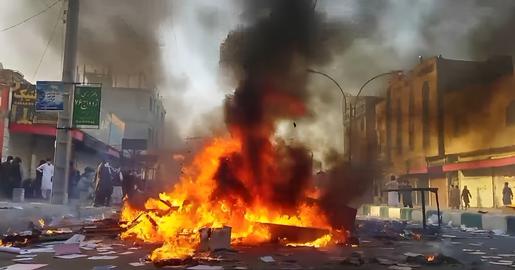With the first anniversary of Zahedan’s Bloody Friday approaching, Iranian security and military institutions have increased pressure on the families of the massacre’s victims in an attempt to discourage them from seeking justice for their loved ones.
On September 30, Iranian security forces opened fire on a peaceful protest in the southeastern city, killing more than 100 demonstrators and bystanders, according to human rights activists in Sistan and Baluchistan province.
The unrest, which erupted some two weeks into nationwide protests demanding fundamental changes in the country, but its trigger were accusations that a regional police chief named Ebrahim Kochakzaei had raped a 15-year-old girl, Maho Baluch, in the port city of Chabahar, also in Sistan and Baluchistan.
Activists have long complained the region has been the victim of discrimination by Iran's Shia clerical leadership, with disproportionate numbers of ethnic Baluch killed in clashes every year and hanged in executions.
Persisting Threats and Harassment
A relative of one of the victims of the Bloody Friday spoke to IranWire about the relentless pressure that his family and others who lost loved ones have been enduring since the massacre.
"We have not experienced a moment of solitude," he lamented. "Every visit, every conversation with clans, with elders and even among ourselves, has been closely monitored."
According to him, security forces have approached clan elders in an effort to dissuade the families from pursuing their grievances and convince them to say their loved ones were killed by armed opposition groups or Baluch political organizations.
"Several times, our family has received financial offers several times, but we immediately rejected them. They proposed declaring our loved one as a martyr and promised us a pension, but our pursuit for justice for those who lost their lives on Bloody Friday in Zahedan will not waver," he said.
He asserts that the security forces are using intimidation tactics to force them into accepting such offers.
Simultaneously, they aim to silence influential figures such as Molavi Abdulhamid, the outspoken Sunni Friday prayer leader of Zahedan, the grieving families and those participating in weekly protests after Friday prayers.
Mounting Pressure as Bloody Friday Anniversary Approaches
As the anniversary of Bloody Friday draws near, families of the victims face increasing pressure, according to human rights organizations in the province.
They say the government has made concerted efforts since early September to persuade the victims’ relatives, influential individuals, clan leaders, and religious figures in Baluchistan to attend a speech by Supreme Leader Ali Khamenei.
On September 11, the website of Khamenei’s office announced that thousands of people from “Sistan, Baluchistan and South Khorasan” attended his address, during which the Islamic Republic’s leader touched upon a range of topics, including "British colonial rule in parts of Asia," but remained silent on the demands expressed by the people.
Shirahmad Shirani, a human rights activist, considers the orchestration of this meeting as being part of a campaign of harassment.
"On September 11, a gathering was held in Tehran, with provincial and national officials, and the ground commander of the IRGC (Islamic Revolutionary Guard Corps) met with many tribal leaders, in an attempt to have them bring the families of the martyrs from Zahedan and Khash to Tehran before Khamenei. However, no one accepted the offer and left. Even among the trusted individuals and clan leaders, there was no discernible support for that event," he said.
After that, Ahmedreza Radan, the commander-in-chief of the police force, visited Sistan and Baluchistan to further pressure the families of the victims, Shirani said.
The offer to provide financial compensation and enroll the victims’ families in the Martyr Foundation or the veterans' fund for those wounded during protests is not exclusive to Sistan and Baluchistan. However, it appears to be more frequently presented by security forces in Baluchistan due to the high levels of deprivation and poverty in this region when compared to other parts of Iran.
Meanwhile, reports have emerged of mass arrests targeting Baluch youths and teenagers in Zahedan in the lead-up to the anniversary of Bloody Friday.
The human rights website Rasank News reported on September 20 that dozens of Baluch were "massively and violently" arrested. Shirani told IranWire that at least 15 teenagers playing football in the Karimabad neighborhood of Zahedan were among those taken into custody.
Protest-Laden Zahedan
Despite the considerable pressure and visits by high-ranking security and military officials, the atmosphere in Baluchistan, particularly in Zahedan, the atmosphere in Zahedan remains insurrectional.
"In Baluchistan, we don't hold ceremonies on the 7th or 40th days after people's death as in other places. Instead, people are preparing for anniversary protests. The protests on the last two Fridays were notably more fervent than in previous weeks," Shirani noted.
Shirani said he expected “substantial civil protests” after Friday prayers on September 29 followed by strikes the following day.
"People's emphasis has been on the prosecution of both the perpetrators and their commanding officers. Even Radan himself, during his visit to Baluchistan last week, conveyed to the clan leaders that the Islamic Republic would not punish its agents. He suggested that, in the end, financial compensation could be offered to the families," he said.
"The people of Baluchistan have learned from experience that ignoring this crime will only repeat such events in the future," Shirani emphasized.
visit the accountability section
In this section of Iran Wire, you can contact the officials and launch your campaign for various problems

























comments